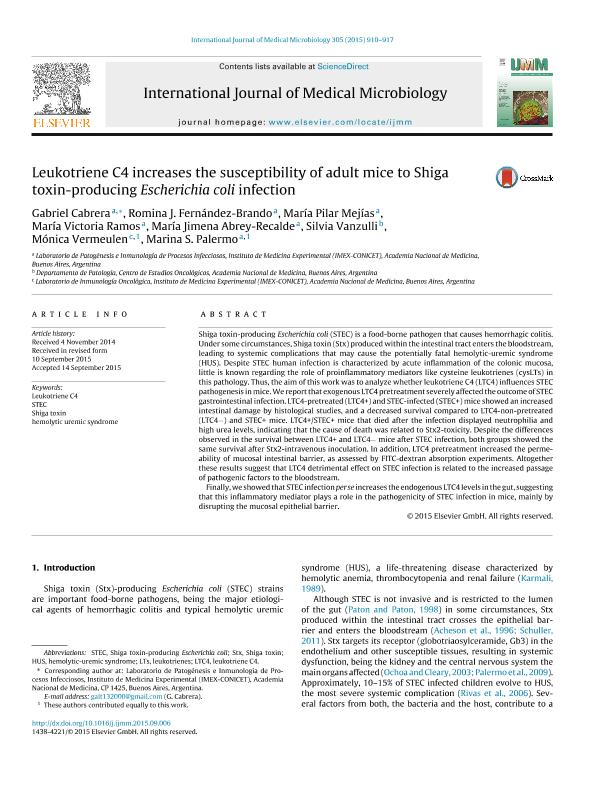Artículo
Leukotriene C4 increases the susceptibility of adult mice to Shigatoxin-producing Escherichia coli infection
Cabrera, Gabriel; Fernández Brando, Romina Jimena ; Mejias, María Pilar
; Mejias, María Pilar ; Ramos, Maria Victoria
; Ramos, Maria Victoria ; Abrey Recalde, Maria Jimena
; Abrey Recalde, Maria Jimena ; Vanzulli, Silvia; Vermeulen, Elba Monica
; Vanzulli, Silvia; Vermeulen, Elba Monica ; Palermo, Marina Sandra
; Palermo, Marina Sandra
 ; Mejias, María Pilar
; Mejias, María Pilar ; Ramos, Maria Victoria
; Ramos, Maria Victoria ; Abrey Recalde, Maria Jimena
; Abrey Recalde, Maria Jimena ; Vanzulli, Silvia; Vermeulen, Elba Monica
; Vanzulli, Silvia; Vermeulen, Elba Monica ; Palermo, Marina Sandra
; Palermo, Marina Sandra
Fecha de publicación:
09/2015
Editorial:
Elsevier Gmbh
Revista:
International Journal of Medical Microbiology (print)
ISSN:
1438-4221
e-ISSN:
1618-0607
Idioma:
Inglés
Tipo de recurso:
Artículo publicado
Clasificación temática:
Resumen
tShiga toxin-producing Escherichia coli (STEC) is a food-borne pathogen that causes hemorrhagic colitis.Under some circumstances, Shiga toxin (Stx) produced within the intestinal tract enters the bloodstream,leading to systemic complications that may cause the potentially fatal hemolytic-uremic syndrome(HUS). Despite STEC human infection is characterized by acute inflammation of the colonic mucosa,little is known regarding the role of proinflammatory mediators like cysteine leukotrienes (cysLTs) inthis pathology. Thus, the aim of this work was to analyze whether leukotriene C4 (LTC4) influences STECpathogenesis in mice. We report that exogenous LTC4 pretreatment severely affected the outcome of STECgastrointestinal infection. LTC4-pretreated (LTC4+) and STEC-infected (STEC+) mice showed an increasedintestinal damage by histological studies, and a decreased survival compared to LTC4-non-pretreated(LTC4−) and STEC+ mice. LTC4+/STEC+ mice that died after the infection displayed neutrophilia andhigh urea levels, indicating that the cause of death was related to Stx2-toxicity. Despite the differencesobserved in the survival between LTC4+ and LTC4− mice after STEC infection, both groups showed thesame survival after Stx2-intravenous inoculation. In addition, LTC4 pretreatment increased the perme-ability of mucosal intestinal barrier, as assessed by FITC-dextran absorption experiments. Altogetherthese results suggest that LTC4 detrimental effect on STEC infection is related to the increased passageof pathogenic factors to the bloodstream.Finally, we showed that STEC infection per se increases the endogenous LTC4 levels in the gut, suggestingthat this inflammatory mediator plays a role in the pathogenicity of STEC infection in mice, mainly bydisrupting the mucosal epithelial barrier.
Palabras clave:
Leukotriene C4
,
Stec
,
Shiga Toxin
,
Hemolytic Uremic Syndrome
Archivos asociados
Licencia
Identificadores
Colecciones
Articulos(IMEX)
Articulos de INST.DE MEDICINA EXPERIMENTAL
Articulos de INST.DE MEDICINA EXPERIMENTAL
Citación
Cabrera, Gabriel; Fernández Brando, Romina Jimena; Mejias, María Pilar; Ramos, Maria Victoria; Abrey Recalde, Maria Jimena; et al.; Leukotriene C4 increases the susceptibility of adult mice to Shigatoxin-producing Escherichia coli infection; Elsevier Gmbh; International Journal of Medical Microbiology (print); 305; 8; 9-2015; 910-917
Compartir
Altmétricas



